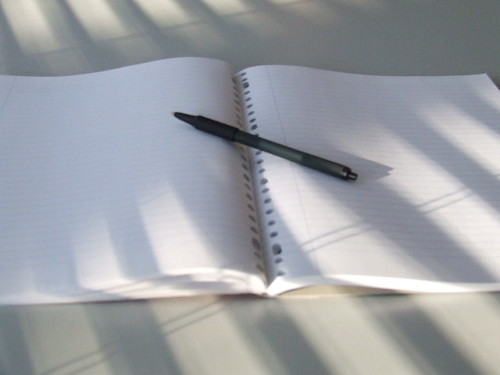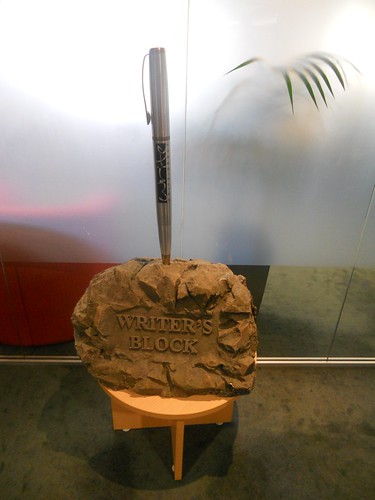
You know what happened, so I won’t go into detail. Instead, let’s focus on a few ways to get words on the page (or the screen) even when it seems we’d rather do almost anything else. For many writers, the trick is to get started, because once we get started, there’s no stopping us!
If you are having trouble getting started with your writing, try one (or more) of these seven strategies to overcome your writer's block.
Strategy #1) Meditate for five minutes
As soon as you realize it is your writing time and you are not writing, stop whatever you are doing, set a timer for five minutes and meditate. I am not an expert on meditation, but I can say that you don’t have to be to do a five-minute meditation. Simply set a timer for five minutes, close your eyes, and focus on your breathing for five minutes. Pay attention to the thoughts that come to your mind, and bid them farewell as you focus on your breathing. I find it easy to bid thoughts farewell as I breathe out, as it feels cleansing.Strategy #2) Cut off the Internet.
Unplug. Open up your Word Processing program. Don’t allow yourself to turn it back on until you have 500 new words on the page. The Internet can be an amazing tool. However, no matter what writing project you are working on, once you have your document in front of you, I am sure there is something you can do to move the document forward without the Internet.Strategy #3) Call a friend.
Tell her you are having trouble writing, but promise to spend the next 60 minutes writing. Ask her to call you back in 60 minutes to tell her how many words you have written. It is amazing what accountability can do.Strategy #4) Do some exercise.
Do 100 jumping jacks or 20 pushups. Walk around the block. My personal favorite is to power up my Xbox and put on a zumba song. I rock out to one song, which takes just five minutes (and burns about 100 calories) and then get back to writing.Strategy #5) Go old school.
Turn off the computer. Pull out a pad of paper and a pen and get to writing. Draw figures to conceptualize your project. Write about why you don’t feel like writing. Write and think through a theoretical puzzle. Write up your methods section. Whatever you do, spend at least 20 minutes with a pen and paper and watch how your writing is reinvigorated.Strategy #6) Have a healthy snack.
Go to the kitchen. Grab an apple. Do something fancy to it, like peel it and cut it into pieces. Or, taken a mango and cut it restaurant-style. Do something methodical and creative with a healthy snack and then eat it. You will be amazed at how that little bit of left-brain activity and a sweet reward can fuel your writing.Strategy #7) Change your location.
If you are working on a laptop or with a pen and paper, move yourself to another room. If you work at a university, try going to the library or a study room. If you are at home, try out the dining room table or the living room. If you live in a studio, try facing a different window. Move yourself to a new location and tell yourself that this is your writing spot for the day.I hope one of these seven strategies works for you. I wouldn’t be surprised if you found it useful to work one or two of these strategies into your everyday writing routine.
Just imagine yourself getting up, preparing a quick, but artful breakfast, then meditating for five minutes, sitting down and writing for 30 minutes before getting up and doing 25 pushups and writing for another 30 minutes. What a rocking morning that would be!

Best of luck with your writing, and let me know which of these (or other) strategies help you move through writer’s block.
Hi Tanya,
ReplyDeleteGood advice. Pen and paper usually do the job for me when I find it hard to start writing. In bad cases together with a change of location. For example to our sunny common room. Typing up is then already the first round of editing.
Best wishes,
Almut
Thanks for the tips. I use Freedom or Self Control, which are programs (I think only for MACs) that prevent me from logging on to the internet for a specific amount of time. They have helped in moments when I've lost all control over my internet addiction. Great Advice!
ReplyDeleteExcellent advice! Exercise (usually running or a brisk walk) and a change of location often work for me. If those ol' standbys fail, I'll read. Sometimes reading the words of others gives me the nudge I need to write my own!
ReplyDeleteI always switch to pen and paper or change location. I'm going to try these other strategies next time. Thanks!
ReplyDeleteGreat advice! A change of scene and talking to other people about anything not related to writing usually works for me. Will give some of your other strategies a go too. :-)
ReplyDeleteWell, I would say these are not strategies for block, they are just strategies for being stuck on a sentence. Real block, that's about your identity -- your right to be writing this -- or else it is about project design. I find that when my paragraph is going around in circles it is that there is some research problem in it, not a writing problem. It means I need to read something, work something out in the ideas.
ReplyDeleteI am in one of those writing disciplines so writing, as in sitting down and putting words together, is not the problem for me. But typically we are pushed to "just write" when really the reading and analysis are not done yet, and this is what I find counterproductive.
Good points. So, you don't find it useful to write through a block? Sometimes I find that writing is thinking. Other times a long walk allows me to think things through. Occasionally, going back to reading works, though sometimes I realize I already knew what I am reading.
Delete(*I am profacero, just too lazy to sign out of other account right now.)
DeleteI am just using different terminology, perhaps. Writing through being stuck, yes, esp. if it is allowed to be writing on the side. Just plowing through when what I have run into is some methodological error, trying to ignore that and just finish on the theory that the next paper will be better and can correct that error, I do not find works. I also find it tends to drive the argument in circles.
But. I had this period of major block and it was about project design. If the Internet had existed I would have asked a lot of questions anonymously or pseudonymously and gotten the answers my senior colleagues, etc., would not give. If I had at that time assigned myself a 250 word writing project, to *write out* (as opposed to think / talk about) the project design issues, my disagreement with my project as planned, etc., I think I could have seen what was going on and untied the knot.
My rants on this generally, though, may not be mainstream. I think a lot of the standard writing advice is for people who have not figured it out -- I don't disagree with the advice, I just figured it out early on because I am in one of those writing disciplines. I have this complex about how you should shortchange research (have only recently come to see that that is what it is). It is possible in my field to keep publishing by putting out small readings of texts, and women of my generation were encouraged to be that kind of scholar since it was assumed we would not do more since we really wanted to be teachers at SLACs and things like that; so all the advice was really geared to people who wanted to figure out how to get enough vita lines, not to people who wanted to undertake major projects. It's always possible to just write something and put it in some journal that counts as peer reviewed. I am not against this and not against publishing preliminary results and so on. I am just raised to know how to do research, but to renounce it -- on the theory that MY research will not be major or if it is, not recognized as such. So usually when I get stuck on something it truly is, I have not let myself finish the research that would solve the problem. So my writing problems are really research problems ...
Ah and also: because of the imperative to just write, write it now, and because I can knock out good prose / readable first drafts, I tend not to do the "free writing" some do (or if I do, I call it heavy notetaking or planning, or if I do, I do it in my head while washing dishes). BUT what I *never* do is sit down and write out whatever *problem* I am having as para-writing or meta-writing. This is what I would really, really recommend to myself for block because it then becomes easy to see which parts of the problem are my irrational fears, to be bracketed and ignored, and which are practical problems that need to be addressed in a concrete way.
Here is a practical problem I once had: I knew the mss. would take x number of hours to do, writing at a reasonable but feasible clip, that there was research to be done first and that I had no estimate of how long it would take but it seemed like a lot, and by the time of the deadline I also knew I did not have that x number of free hours, but only about half of it. I could not see how to cut the time down, so could not see where to start. And called it a discipline and motivation problem when really it was much less nebulous than that. I was so used, in those days, to being told that any practical problem one saw was just a conspiracy to be lazy...
You know how Colette wrote, don't you? Her husband locked her in a room and wouldn't let her out until she had produced some work!
ReplyDeleteJust joking around. I think academics worry too much about "production" anyway.
Coming back much later --
Delete@Hattie, produce, we have to.
But I still would not call needing a break, etc., block -- if you can take a walk to think things through, you were not blocked, just needed to think something through or needed to move around, I claim. I consider needing breaks or a walk a normal part of writing -- or doesn't everyone take these?
I do not know whether my long rant above is comprehensible to other people but I still say real block is something that takes much more to dislodge; maybe this is just a question of naming but if what you describe is "writer's block" then I do not know how to name what I have been through...